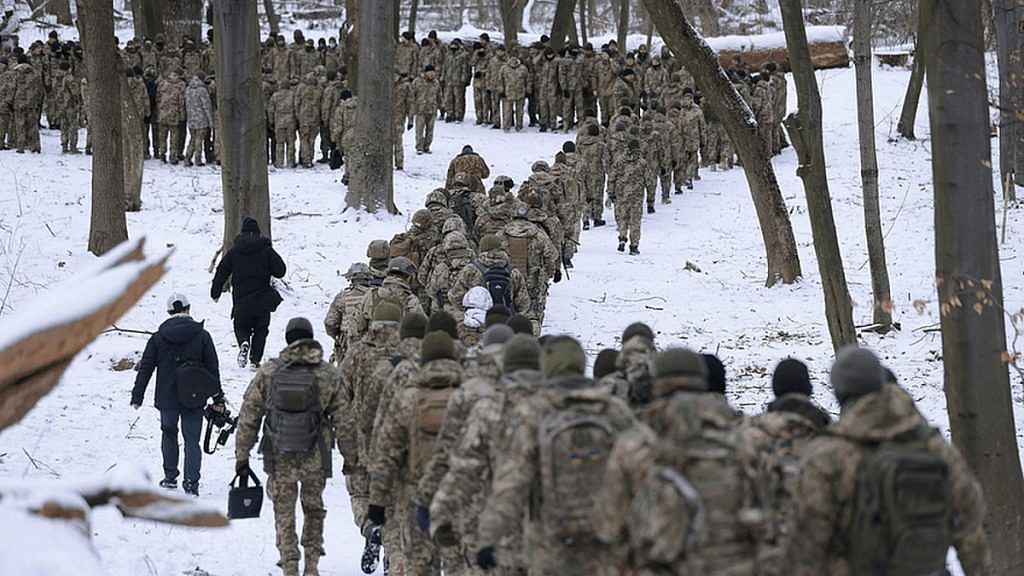New Delhi: A week after he announced that Russia had decided to partially pull back troops from the Ukraine border, Russian President Vladimir Putin Monday signed a decree to officially recognise the independence of two separatist regions in eastern Ukraine — Donetsk and Luhansk.
Soon after, the United States announced financial sanctions against the rebel territories recognised by Russia, and the European Union (EU) is set to follow suit.
Putin’s decision undermines efforts between Russia and the North Atlantic Treaty Organization (NATO) to de-escalate tensions triggered by intense speculation about an imminent invasion of Ukraine by Russia.
It comes after the Russian Parliament or Duma last week backed a resolution calling for diplomatic recognition of the two breakaway territories.
The United Nations (UN) Security Council had convened an emergency meeting late Monday where it condemned Moscow for “violating international law”. US Ambassador to the UN Linda Thomas-Greenfield also rubbished Russia’s claims that its troops were being deployed to eastern Ukraine on a “peacekeeping” mission.
The pro-Russian separatist regions in Donetsk and Luhansk had declared independence from Ukraine in 2014. No country had recognised the republics as sovereign states until now.
Also Read: Ukraine crisis is a litmus test for all — US, EU, UN, and also for India
How Donetsk & Luhansk came into being
Donetsk and Luhansk are two states located in eastern Ukraine, which share a border with Russia. Within these two states are two separatist territories known as the Donetsk People’s Republic (DPR) and Luhansk People’s Republic (LPR), which are run by Russian and Russian-backed separatists.
This entire region, which includes Donetsk, Luhansk and their respective separatist territories, is generally referred to as the ‘Donbas’ region.
Russia has long asserted that since these are primarily Russian-speaking territories, they need to be protected from “Ukrainian nationalism”. The presence of Russian speakers came about as many Russian workers were sent there after World War II during the Soviet era, according to an Al Jazeera report.
Although the Russia-Ukraine conflict technically began in 2013, when the then Ukrainian President Viktor Yanukovych, seen as pro-Russia and overthrown in 2014, rejected a deal for greater integration with the EU, sparking mass protests, what sent separatists in Donetsk and Luhansk over the edge was something slightly different.
Russia invaded Ukraine in early 2014 and annexed its southern autonomous republic of Crimea. This was after Crimea, primarily made up of Russian speakers, voted to join the Russian Federation in a disputed local referendum. Two months later, rebels in Donetsk and Luhansk held similarly disputed referendums, the results of which paved the way for the separatist territories to be declared as LPR and DPR.
This is why the situation in eastern Ukraine cannot be classified only as a civil war; Russia has a hand in it too.
The separatist portions of Donetsk and Luhansk have been largely cut off from Ukraine since 2014, and consist of very small populations. According to rough estimates quoted in an Al Jazeera report, DPR is home to 2.3 million people while LPR has a population of around 1.5 million. Both are primarily industrial areas on the border with Russia on the northern banks of the Black Sea — home to vast coal reserves.
These breakaway territories are heavily dependent on Moscow for financial and military support, and their leaders have openly proposed joining the Russian Federation.
Denis Pushilin and Leonid Pasechnik, the leaders of the separatist entities of DNR and LNR, respectively, signed Treaties of Friendship, Cooperation and Mutual Assistance with Russia Monday, alongside Putin’s decree to officially recognise the two breakaway territories.
The people of Donetsk and Luhansk have lived war-torn lives ever since Russian and Russian-backed separatist forces occupied the areas in 2014. An estimated 14,000 people have been killed in ongoing conflict over the last eight years.
According to a CBC video report last month, the only way into the separatist region of Donetsk is through a series of checkpoints and roadblocks requiring permission from the Ukrainian military and Russian-backed separatists in the area.
Why is Putin’s move controversial?
Ukrainian Foreign Minister Dmytro Kuleba has said that the resolution passed by the Duma last week “undermines Minsk agreements and the peace process”.
We have officially addressed the UNSC with an initiative to discuss Russian State Duma’s appeal to recognize the so-called ‘LDNR’, which undermines Minsk agreements and the peace process. We requested UNSC to consider the issue at the February 17th meeting on Minsk agreements.
— Dmytro Kuleba (@DmytroKuleba) February 16, 2022
The Minsk agreements refer to two accords signed in September 2014 and February 2015 in a bid to quell fighting in the Donbas region. Minsk I was essentially a ceasefire signed between Ukraine and Russian-backed separatists in the Belarusian capital, but did not hold up.
In July 2014, a Malaysia Airlines passenger flight from Amsterdam to Kuala Lumpur was shot down over separatist-held territory in Ukraine, killing 283 passengers and 15 crew members. Russian-backed separatists in the region have been held responsible for the crash.
This is the main basis on which Ukraine officially considers LPR and DPR as terrorist organisations, although that is a designation yet to be agreed upon by the US, EU or the UN.
Minsk II was more comprehensive, and it was signed by representatives of Russia, Ukraine, the Organisation for Security and Cooperation in Europe (OSCE), and heads of the two pro-Russian separatist regions. However, military and political steps enshrined under the accord are yet to be implemented, mainly due to Moscow’s insistence that it was not a party to the conflict in eastern Ukraine, and that the agreement therefore did not apply to it.
(Edited by Gitanjali Das)
Also Read: India breaks its silence on Russia-Ukraine crisis, calls for ‘peaceful resolution’
